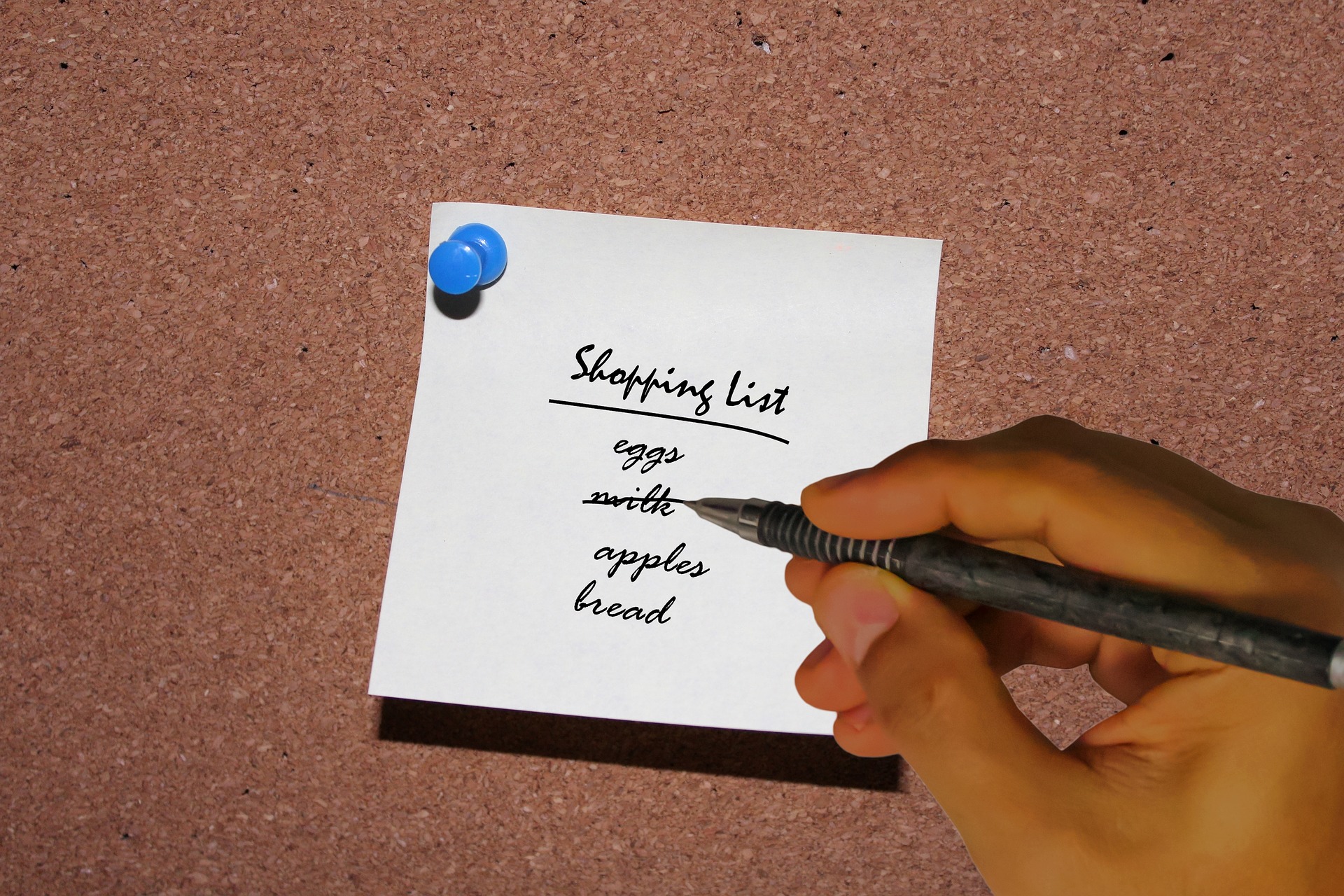How often do you plan to go to the grocery store with only a rough idea of what you want to buy memorized? However, once you arrive at the grocery store, you appear overwhelmed by the options, and you either make an impulsive purchase that is unnecessary, or you forget to buy something critical.
If you’re anything like us, this is probably the case every time you go grocery shopping. This is where having a grocery list comes in handy. According to a March 2017 survey in Canada, only 48% of grocery shoppers agreed to make a shopping list every time. While 38% agreed to do it occasionally, nearly 14% agreed to do it rarely or not at all.
It is always a good idea to have a grocery list handy, whether you are going to buy groceries in person or online, because it saves time and money, encourages a healthy lifestyle by developing the habit of meal planning, and makes the monotonous process of shopping less boring, if not enjoyable.
You’ll be surprised at how a simple activity like making a shopping list (which should only take about 10-15 minutes) can save you a lot of time, energy, and other resources. Let’s get right into it and learn about the significant benefits of making a shopping list.
Saves Money
Have you ever wondered why products are arranged in supermarkets or grocery stores the way they are? If you believe that these products are just randomly placed in their positions by the store, you could not be more wrong. Grocery stores strategically place products based on extensive research on human behavior.
The goal is to make the products appear appealing and entice the consumer to purchase as much as possible. If you enter a supermarket without a shopping list, you are more likely to give in to your impulses and overspend by purchasing items that you did not need but ended up buying because of advertisements or promotions.
According to a survey conducted by the National Retail Federation, nearly half (49%) of shoppers said they make unplanned purchases every time they go to the store. A study published in the Journal of Consumer Research found that shoppers who didn’t use a list spent, on average, 23% more than those who did. The same study also found that shoppers who didn’t use a list were more likely to purchase unhealthy foods, such as junk food and sugary drinks.
Making a shopping list can reduce, if not eliminate, the desire to make impulsive purchases. The introduction of coupons and discounts has resulted in consumers purchasing products solely because they believe it is a good deal, without considering the product’s actual utility in their lives.
In a survey, by Bankrate, shoppers who do not use a list spend an average of $2,076 per year more than those who did use a list. A shopping list can help you completely avoid this mess by ensuring that you do not go over budget while also instilling the habit of discipline.
Why not save some money while you can?
Encourages Meal Planning
Meal planning appears to be a long-lost concept in today’s fast-paced world, where people are constantly multitasking and is usually the last thing on most people’s to-do lists, however, it can help reduce food waste and maintain a healthy, balanced diet.
Improper Meal Planning has resulted in unhealthier lifestyles, whether knowingly or unknowingly because people prefer fast food to healthy freshly cooked meals. It can lead to a wide range of health issues and diseases, so it is critical to take this seriously.
Making a shopping list encourages meal planning because your list will be based on the meals you intend to eat. A list can help you keep track of the items you need to buy for your meals, allowing you to stay organized and avoid forgetting important ingredients.
Because you plan your meals, you become more open to trying new recipes and incorporating more variety into your diet, which not only allows you to create a more wholesome and healthy diet but also reduces food waste because you know what you need to buy and are less likely to purchase items that will go bad before you have had a chance to use them.
A study by the University of Minnesota found that households that planned meals and prepared grocery lists had a higher diet quality score than those who did not. The study also found that meal planning was associated with a lower body mass index (BMI) and lower food expenditures.
Increases Efficiency
You might believe that making a shopping list takes longer than simply remembering what you want to buy in your head. The irony is that making a shopping list can save you time. You’re probably wondering how that works. Please allow me to explain.
If you have a shopping list, you will know exactly what products you are looking for, making it less likely that you will give into distractions and wander around the store looking for the items you require, making it relatively easier to locate those items in the grocery store.
Compare this to someone who does not have a shopping list and shops with the intention of “looking around the store to see what he needs.” The latter is more likely to spend more time in the store wandering around different sections of the supermarket and looking down every aisle, wondering if he has everything he needs or if there is something he is missing.
According to a survey by the National Grocers Association, shoppers who use a grocery list spend an average of 23 minutes less time in the store than those who do not. In a study published in the Journal of Consumer Research, shoppers who used a list were less likely to revisit aisles, which helped them save time and make more efficient shopping trips. Having a list handy also ensures that you do not overlook any important products and saves you loads of time, which you could use for more productive ventures.
Nobody enjoys spending more time than necessary in a grocery store; making a grocery list will ensure that you are in and out of the store as quickly as possible, hopefully making the experience of grocery shopping exciting.
Promotes Healthy Lifestyle
Grocery shopping can help people live a healthier lifestyle by encouraging them to eat healthier foods, prioritize fresh, whole foods, and avoid unhealthy foods and snacks. Consumers can ensure they are purchasing nutritious and balanced foods that meet their dietary needs by planning ahead of time and making a shopping list. This can result in a better diet, a lower BMI, and a lower risk of chronic diseases such as obesity and type 2 diabetes. Furthermore, planning ahead of time can reduce stress and anxiety associated with mealtime decisions, which can contribute to a healthier and more balanced lifestyle.
However, few people are aware of the psychological benefits of making a shopping list. Crossing items off your grocery list after you’ve put them in your cart can be strangely satisfying. Do you understand why? It is simply because our brain releases dopamine even when we successfully complete the most basic tasks. It improves your mood and makes you feel better about yourself. It’s also true that achieving these small victories will motivate you to strive for bigger ones later in life.
It can positively impact an individual’s overall wellbeing, improving your sense of control and reducing feelings of overwhelm. Making informed decisions about what to buy can also help you feel more confident and capable, which can positively impact self-esteem. Additionally, having a plan can give you a sense of purpose and accomplishment. Overall, the psychological benefits of preparing a grocery list can contribute to a more balanced, fulfilling, and positive lifestyle.
Conclusion
To conclude, making and sticking to a grocery list has numerous benefits, including saving time and money, reducing food waste, and aiding in the maintenance of a healthy and balanced diet. Grocery shopping becomes a more organized and efficient process when you plan and only buy what you need. Having a grocery list promotes a healthy lifestyle (physically and mentally).
So, make it a habit to create a shopping list to make your grocery shopping experience more enriching, enjoyable, efficient, and enjoyable. Depending on your preferences, you can have a shopping list written on paper or digitally. Numerous online applications can make the process of creating grocery lists easier.
Do you create a grocery list? If so, please share your experience. If not, you already know what to do the next time before you go shopping.




GIPHY App Key not set. Please check settings